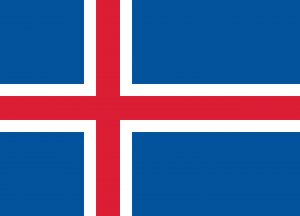Language/Icelandic/Vocabulary/Education
Hi Icelandic learners! 😊
In this lesson, we will be discussing Icelandic vocabulary related to education. We will cover basic terms to help you communicate in Icelandic in a classroom or educational setting. We will also provide cultural information and interesting facts to make learning fun and engaging. Remember, practice makes perfect! Don't be afraid to use the vocabulary you learn here in real-world situations.👨🎓👩🎓
Consider broadening your understanding by checking out these related lessons: Days of the Week & Emergency survival phrases Neyðar og lífsbjargarfrasar.
Icelandic Educational System[edit | edit source]
Iceland has a very high literacy rate, with almost 100% of the population being able to read and write. The Icelandic educational system is divided into four levels: playschool (leikskóli), compulsory education (grunnskóli), upper secondary education (framhaldsskóli), and higher education (háskóli). In this section, we will cover vocabulary related to each level.
Playschool (Leikskóli)[edit | edit source]
Playschools are intended for children between 18 months and six years of age. The first two years are non-compulsory and mostly focused on play-based learning. Here are some words related to this level of education:
| Icelandic | Pronunciation | English |
|---|---|---|
| Leikskóli | leyks-koh-lee | Playschool |
| Börn | bœrn | Children |
| Leikfang | leyk-fahng | Toy |
| Kennari | khen-nah-ree | Teacher |
Dialogue:
- Person 1: Hvað er þetta? (What is this?)
- Person 2: Þetta er leikfang. (This is a toy.)
- Person 1: Já ég vil leika. (Yes, I want to play.)
- Person 2: Mér líkar að leika líka. (I like to play too.)
Compulsory Education (Grunnskóli)[edit | edit source]
Compulsory education is required for children between the ages of 6 and 16. Students attend primary school (barnaskóli) from grades 1 to 7 and then lower secondary school (ungmennaskóli) from grades 8 to 10 or 9 to 10. Here are some words related to this level of education:
| Icelandic | Pronunciation | English |
|---|---|---|
| Grunnskóli | grooms-koh-lee | Compulsory Education |
| Kennslustofa | khen-sluh-stoh-fah | Classroom |
| Námskrá | nahms-krah | Curriculum |
| Námsár | nahms-owr | Academic Year |
Dialogue:
- Person 1: Hvar er kennslustofan? (Where is the classroom?)
- Person 2: Hún er í efnisstofu. (It's in the science room.)
- Person 1: Þetta er erfitt. (This is difficult.)
- Person 2: Nei, það er auðvelt. (No, it's easy.)
Upper Secondary Education (Framhaldsskóli)[edit | edit source]
Upper secondary education is for students between the ages of 16 and 20. Students can choose to pursue vocation-based studies or university preparation studies. Here are some words related to this level of education:
| Icelandic | Pronunciation | English |
|---|---|---|
| Framhaldsskóli | fruhm-hahlds-koh-lee | Upper Secondary Education |
| Verkmenntaskóli | vehrk-mehnt-tah-skoh-lee | Vocational School |
| Almenn braut | ahl-mehn brawt | General Studies |
| Sérstök braut | sehr-stœk brawt | Specialized Studies |
Dialogue:
- Person 1: Hvað ætlarðu að læra í framhaldsskóla? (What are you planning to study in upper secondary school?)
- Person 2: Ég ætla að læra efnisfræði. (I plan to study chemistry.)
- Person 1: Ég ætla að læra tölfræði. (I plan to study mathematics.)
- Person 2: Það hljómar erfitt! (That sounds difficult!)
Higher Education (Háskóli)[edit | edit source]
Higher education is available to students who have completed upper secondary education. The University of Iceland (Háskóli Íslands) is the oldest and largest university in Iceland. Here are some words related to this level of education:
| Icelandic | Pronunciation | English |
|---|---|---|
| Háskóli | how-skoh-lee | University |
| Námskeið | nahms-kay-the | Course |
| Ritgerð | rit-yehrth | Thesis |
| Beinatótt | bane-ah-toht | Distance Learning |
Dialogue:
- Person 1: Hvað ertu að læra í háskóla? (What are you studying in university?)
- Person 2: Ég er að læra lögfræði. (I'm studying law.)
- Person 1: Er það ekki erfitt? (Isn't that difficult?)
- Person 2: Já, en ég hef gaman af því. (Yes, but I enjoy it.)
Useful Phrases[edit | edit source]
Here are some phrases that you might find useful in an educational setting:
- Mér vantar hjálp - I need help
- Get ég fengið eintak af bókinni? - Can I get a copy of the book?
- Ég skil ekki - I don't understand
- Talaðu hægt og skýrt, takk - Speak slowly and clearly, please
- Ég er búinn að læra - I'm finished learning
Practice[edit | edit source]
To improve your Icelandic vocabulary, you can also use the Polyglot Club website. Find native speakers and ask them any questions! You can also review the Icelandic vocabulary page.
Sources[edit | edit source]
- Icelandic Vocabulary on the App Store
- Icelandic: Linguistic Maintenance or Change? The Role of English ...
- Learn Icelandic Language on the App Store
Other Lessons[edit | edit source]
- Basic Icelandic Phrases
- General Home
- Animals
- Asking for directions Að biðja um hjálp og leiðbeiningar
- Holiday Wishes Phrases
- How to Say Hello and Greetings
- Geography
- How to say Good Bye?
- Health
- Feelings and Emotions

